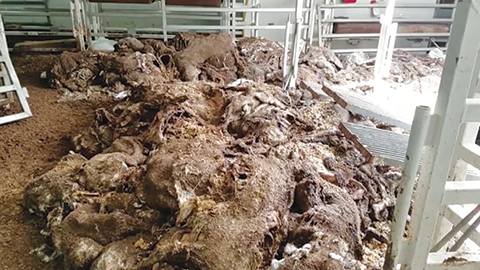 A picture allegedly showing rotting bodies of sheep that died en route to the Middle East. Source: Animals Australia
A picture allegedly showing rotting bodies of sheep that died en route to the Middle East. Source: Animals AustraliaKUWAIT: A number of Australian legislators yesterday demanded an official ban on exporting sheep to the Middle East in response to footage circulating in media outlets worldwide showing hundreds of sheep shipped from Australia to Middle Eastern countries including Kuwait and other GCC states dying because of thermal fatigue. Yesterday, parliamentarian Susan Lee introduced legislation that would “gradually phase out the live sheep export trade in the Middle East over the next five years.” The bill is titled “Long-term sheep export ban for 2018.” “A decision will be made to immediately suspend the export of live sheep over the three months of the summer, from July to September,” she said.
The draft resolution has the support of the Green Party and the Labor Party in the Australian parliament, and if the resolution is passed, the shipment of shiploads of live Australian sheep to the Middle East will be finished by 2023, Australian media, like the SBS news network, said. Lee said she had “decided to introduce the legislation after disturbing video footage surfaced earlier this year, showing the death of sheep in appalling conditions on flights to the Middle East,” Australian newspapers and media reported. “The opposition will support the bill,” Australian Labor Party spokesman Joel Fitzgibbon said. “Member bills are not the best way to encourage legislation, but that’s what happens when the government today gives way to a very important issue for the Australian community,” he told reporters in Canberra.
Meanwhile, former National Party leader and Australian Agriculture Minister Barnaby Joyce rejected the bill, stressing that “the decision has many drawbacks. If the live sheep trade is closed, you will make people poorer,” the minister told reporters yesterday. Prime Minister Malcolm Turnbull told parliament yesterday: “The government supports the export trade, which respects the society’s views on animal well-being. We are taking immediate action to ensure that animal welfare is maintained.”
Kuwait’s Al-Mawashi company, the largest importer of Australian live sheep, had revealed that it is looking to find other secure sources of livestock as a result of Australia’s talk of banning the trade. Osama Boodai, chief executive officer of Al-Mawashi, was quoted by the Northern Daily Leader of Australia stating that those on the Middle Eastern side of the trade were also outraged at the footage on board sheep ships, saying “those conditions were not acceptable to any of us.” Boodai visited Australia to talk to politicians and farmers about the reality of conditions on livestock vessels. “People are judging us without having all the facts in front of them,” he said.
Al Mawashi, which incorporates the Kuwait Livestock Transport and Trading, is a majority government-owned business focused on food security rather than maximizing profits, he explained. It was subsidized by the Kuwait Government until it became self-sustaining and has been importing Australian sheep for four decades. “Kuwait is not an agricultural region but given we sense the threat to livestock imports, we have started building our own flock and are hoping to increase its capacity,” he said. “However, there are real limitations to our production potential and ability to ever be self-sufficient. That’s why for countries in the Gulf, the livestock trade is a matter of national food security.”
By A Saleh










